Author // Sarah Mowery Tuesday, 13 April 2021
School districts across the state of Ohio are developing extended learning plans to continue student acceleration of learning. This is the 4th blog in the series of Extended Learning Plans and the Simple View of Reading.
Literacy skills lay at the foundation for all learning. Success in reading, writing, speaking, and listening competencies is directly related to the language and literacy skills that students possess and has a direct impact on all content areas and across all grade levels. It is for this reason that a focus on literacy is important to include in extended learning plans.
Let INFOhio, Ohio's PreK-12 digital library, be your school district's partner as you accelerate and extend student learning. INFOhio offers a variety of PreK-12 digital learning resources at no cost to Ohio's students, educators, and parents that can support the Simple View of Reading's foundational literacy skills including building background knowledge across the Language and Literacy Development Continuum.
Ohio's Plan to Raise Literacy Achievement is grounded in the framework of the Simple View of Reading and the instructional concepts that are needed in literacy development from emergent to adolescent language and literacy. Learning to read requires learners to develop two foundational skill sets: to read each word accurately and fluently within a text, and understand that the text conveys meaning. This is the Simple View of Reading.

Using this formula helps educators identify areas of instructional need for striving readers. The Simple View of Reading applies across all grade levels and can be used as a guide for your extended learning plan for literacy. Alphabet knowledge, fluency, background knowledge, vocabulary, and writing instruction are all components of the Language and Literacy Continuum that INFOhio resources can help to support. Let the instructional components of the Simple View of Reading and INFOhio help you help your learners this summer.
Building background knowledge and activating prior knowledge is essential for students' understanding of the texts they read across the content areas. Researchers from a 2019 study published in Psychological Science discovered a "knowledge threshold" for background knowledge and reading comprehension. They found that if students were unfamiliar with 59 percent of the content in a text, their ability to understand the text was significantly compromised. Research also indicates that individuals with an expertise in certain areas will be able to comprehend higher level texts in that area of expertise better than those who do not know a lot about a topic. "Put simply, the more you know about a topic, the easier it is to read a text, understand it, and retain the information" (Neuman, Susan B., et. al. 2014).
How do we help students build background knowledge? Exposure to informational text and other genres of literature throughout literacy development will provide students with a foundation of acquired knowledge to overall increase reading comprehension. Provide students with:
Creating built-in time for reading in your daily lessons gives students continued and consistent exposure to text. The more exposure to different types of texts, the more well-rounded and stronger a student's knowledge foundation will become. According to Doug Lemov (2017) in How Knowledge Powers Reading, embedded nonfiction is "the idea of connecting and combining nonfiction with other texts (both fiction and non-fiction) to ensure richer engagement and better leveraging of knowledge." For example, when reading a class novel provide students with magazine and newspaper articles that provide additional support for topics or current events that coincide with the events in the novel. Also consider asking knowledge-based questions based on the readings. While not all questions should be fact-based or require lower-skilled thinking some should focus on determining the knowledge gained from the text. Lemov (2017) found that "by asking some fact-based questions, we can chip away at the knowledge deficit and teach our students how to unlock knowledge from what they read."
World Book Kids, World Book Student, and World Book Advanced
World Book offers PreK-12th grade students online encyclopedias that provide informational text articles, eBooks, videos, primary sources, activities, read-aloud options, and translation features. These are a great place to start to help students acquire knowledge and build their background knowledge on specific topics. Using the articles in the World Book products can support the strategy of embedded nonfiction. Are you reading a class novel that includes unfamiliar historical or scientific topics? Create text sets that include nonfiction articles specifically about these unfamiliar topics to give students knowledge-based support to fully understand what they are reading.
World Book Kids, a resource designed for PreK-5th grade students, provides multiple forms of media for students to acquire content knowledge such as videos, images, comparing tools, and maps. There is also a read aloud feature, which allows students to listen to the article and words are highlighted as they are read.

World Book Student, a resource designed for students in grades 5th-8th has recently added Legends of Learning Games that connect to math and science standards within specific articles to further boost background knowledge and understanding of informational text articles. Gamification of content can help with student engagement of the materials and deepen understanding. For example, in the image below, this article on plate tectonics includes a game that has students answer questions related to subduction and seafloor spreading to move a seal to safety. Here is a complete list of the games and the articles and standards that connect with them, Legends of Learning Games.
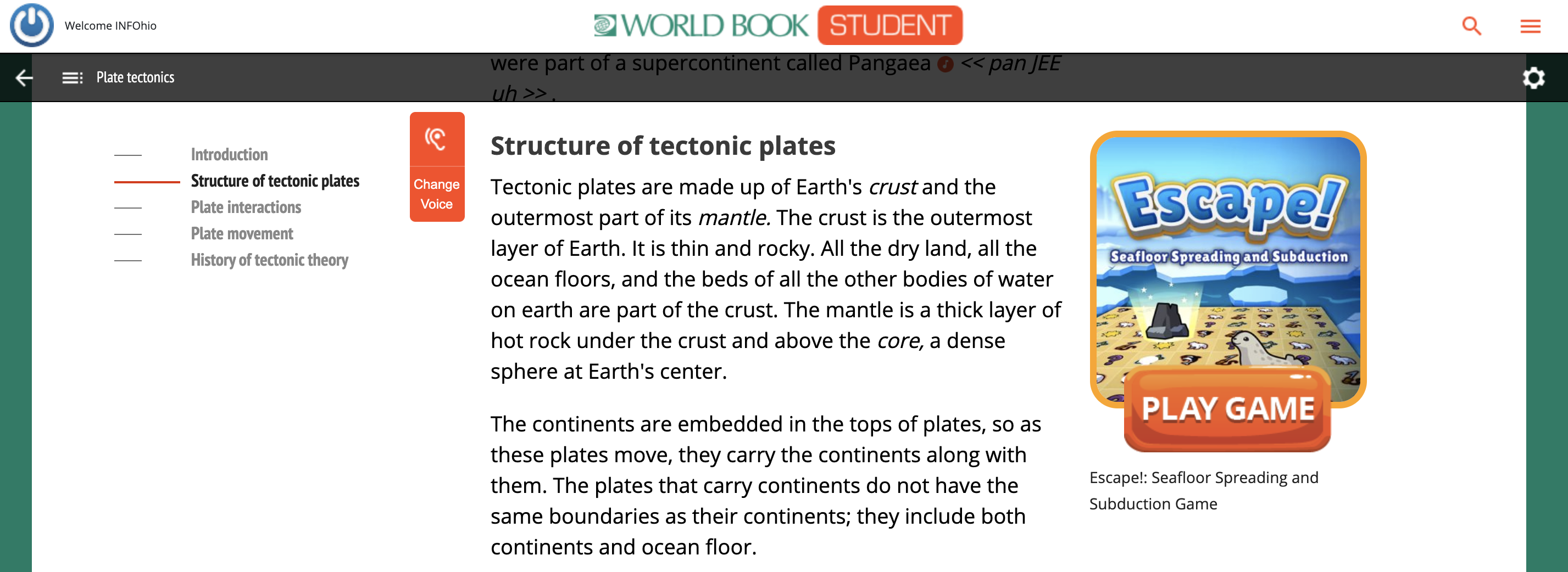
World Book Advanced, a resource designed for 9th-12th grade students includes related articles, primary source documents, videos, and images that connect to each article. Primary source documents provide a way for students to understand the historical connection between what they are reading and further deepen their knowledge acquisition. In the example below, the Related Information tab is selected, which provides additional encyclopedia articles, eBooks, books, primary sources, websites, and more content about the topic of your search.
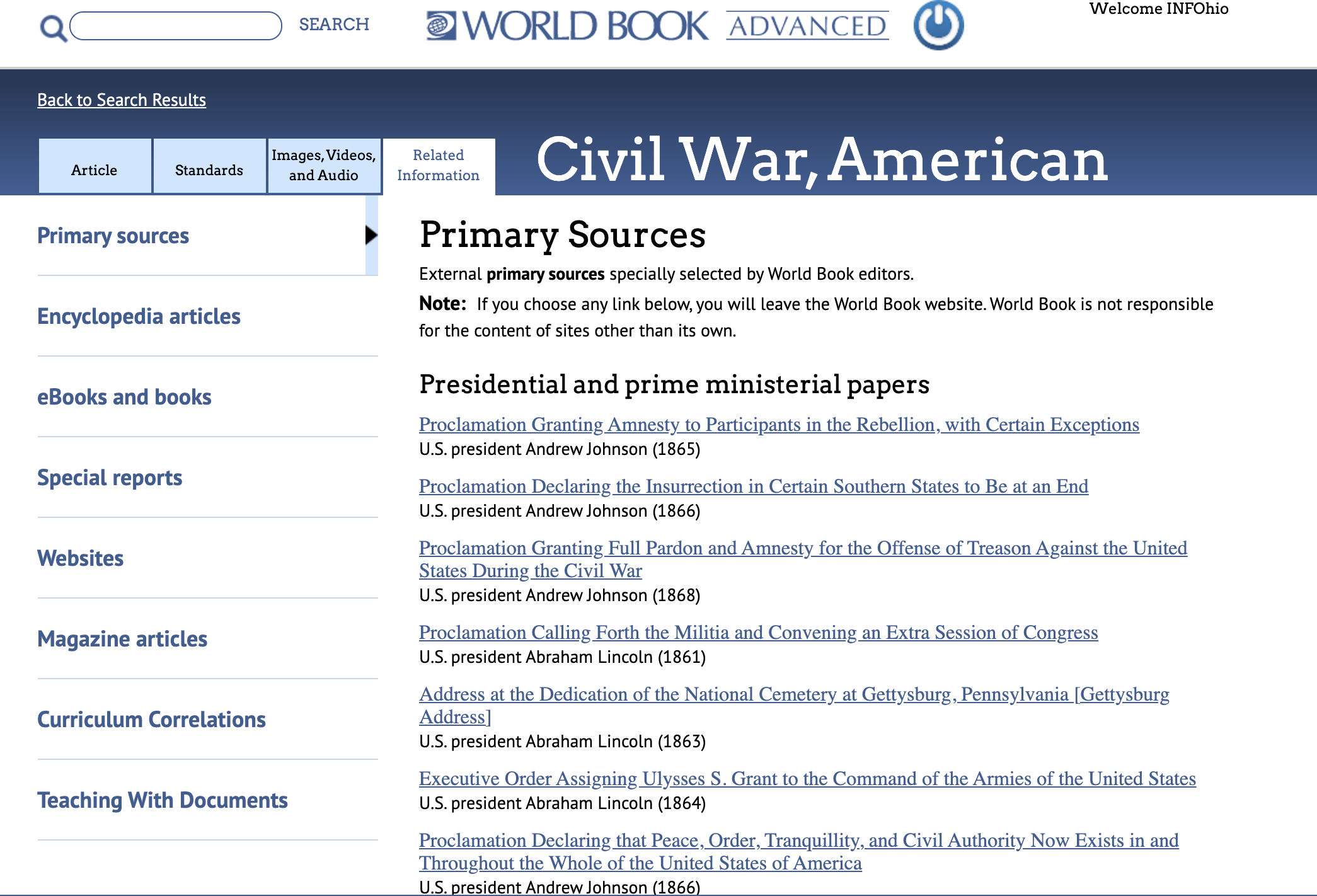
Science Reference Center and Science Online
To further build background knowledge of science topics within the curriculum, Science Reference Center and Science Online provide informational text articles, videos, images, science experiments, and interactive science activities.
Science Reference Center designed for 5th-12th grade students provides math and science encyclopedias, journal articles, popular magazines, and science experiments. Information is sorted on the homepage by branches of science making it easy to browse and narrow topics of study.
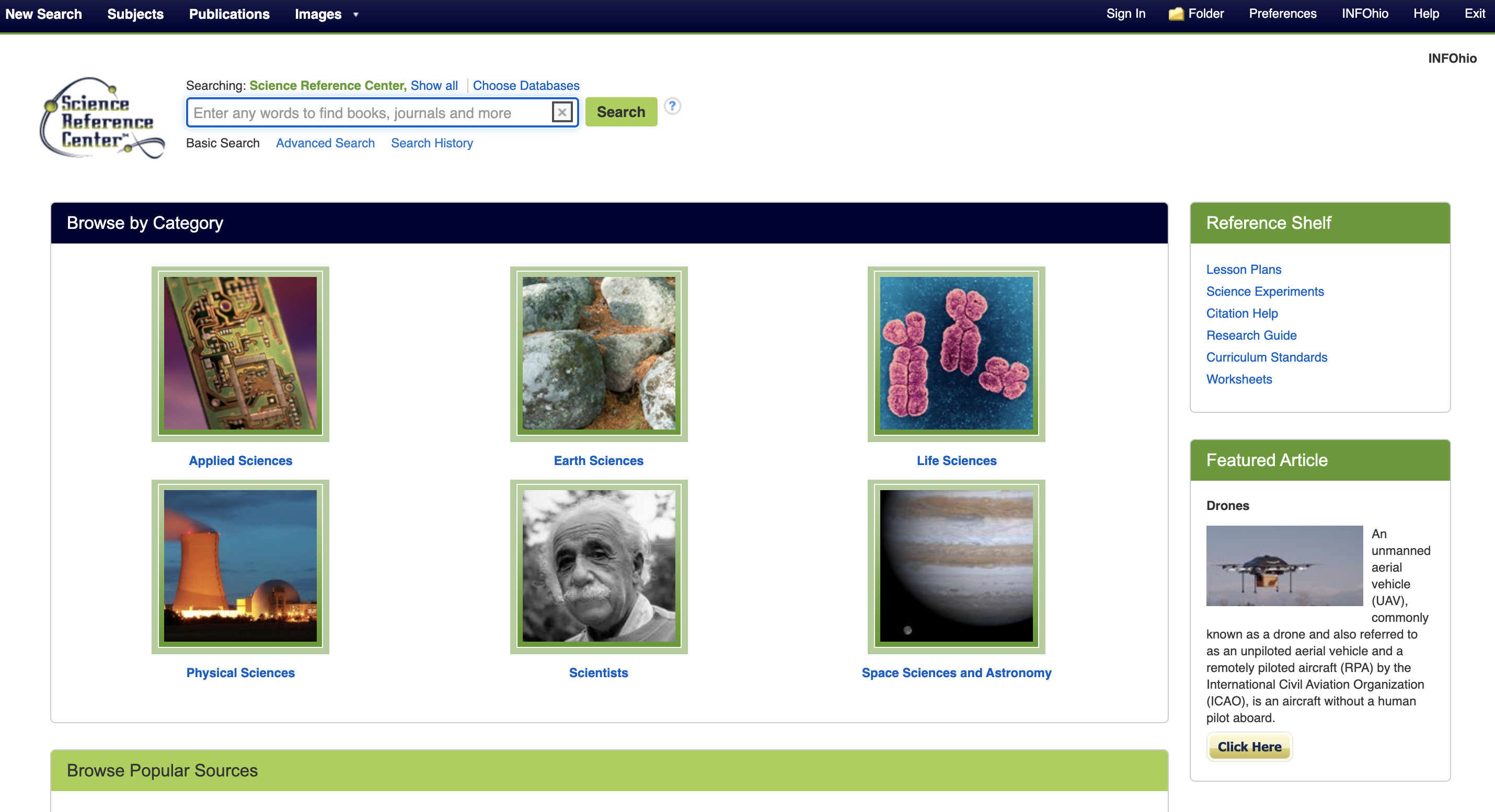
Science Online intended for students in grades 9th-12th not only provides a variety of media for various learning styles, it also divides content by topic and has biographies, interactive science simulations, and eLearning modules. eLearning modules are set up in a way to provide materials in a sequence for optimum learning and knowledge acquisition.
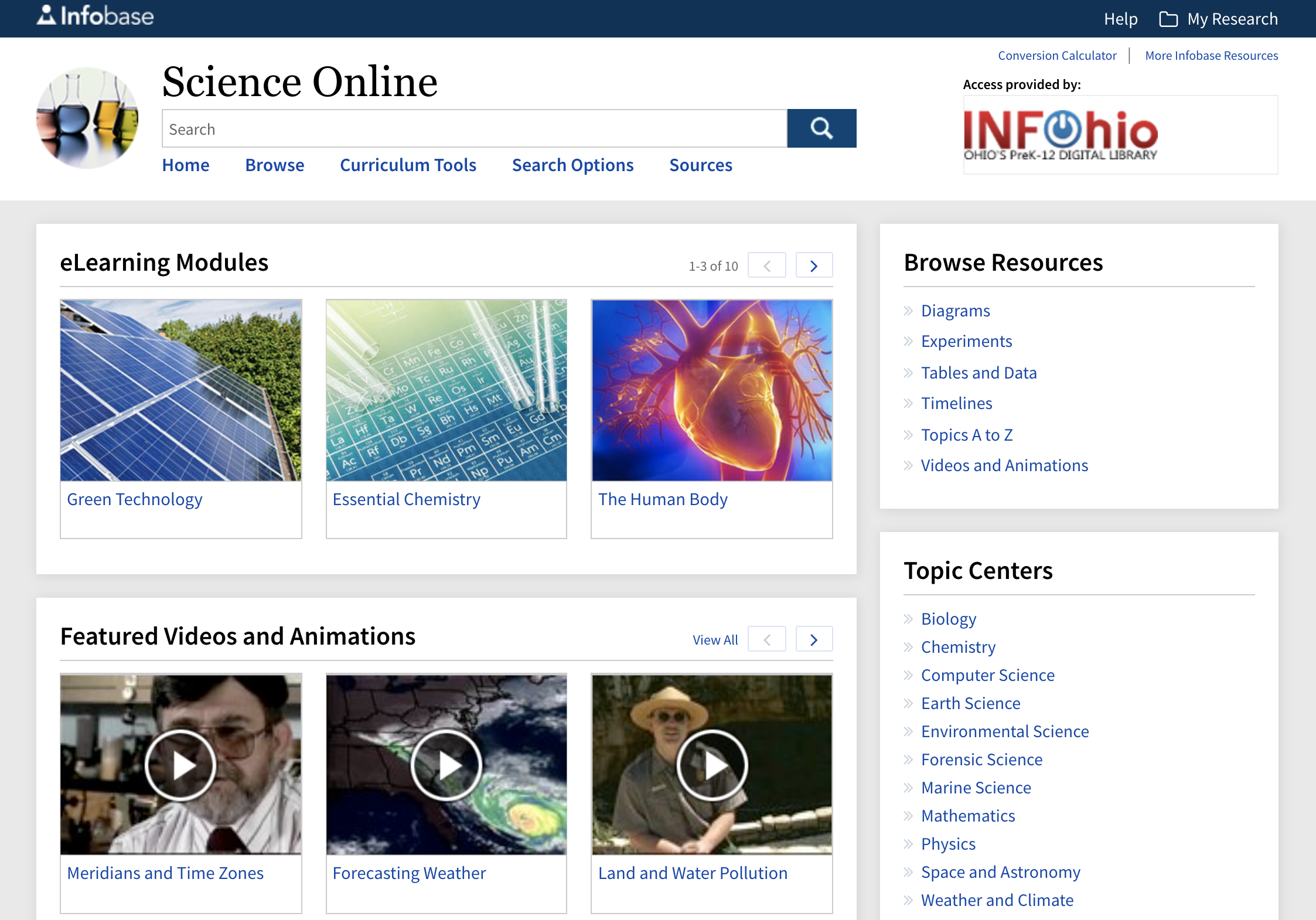
Points of View Reference Center
Points of View Reference Center, for 6th-12th grade students, provides a collection of multiple perspectives on current topics and issues. Each topic gives thorough background information to deepen student understanding. In addition to in-depth information on the topic, each topic also gives counterpoint and point information to see all perspectives. Related information is also included. All of this provides many ways for students to acquire knowledge and gain needed background knowledge on a topic.

ISearch
ISearch lets you search nearly all INFOhio resources from a single search box. It includes your school library collection if your school automates with INFOhio’s Library Services Platform. This resource would be an additional way to find magazine, newspaper, journal articles, or other forms of learning media that could be used to support adding embedded nonfiction texts. Many of the texts within ISearch are PDF, which allows students to see what the magazine article would actually look like and includes all of the text features, images, and captions as well. Here is an example from Scholastic News, "Protect Our Planet."
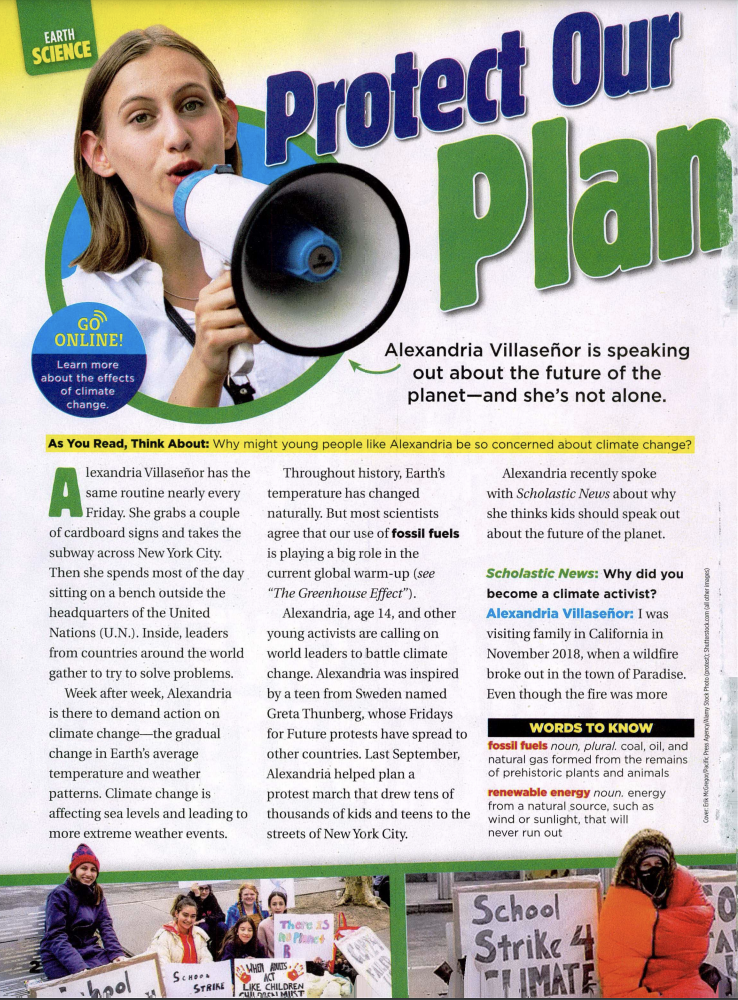
INFOhio, Ohio's PreK-12 Digital Library, is dedicated to providing equitable access to quality instructional materials to meet students where they are. All resources are provided at no cost to Ohio's educators, students, and families. To help support teachers with the instructional components in the Simple View of Reading and help you plan for extended learning, tune in for two more blogs in this series that will share specific strategies and INFOhio resources that can support learning in:
For even more specific information about strategies and how INFOhio can support you, check out the first three blogs in this Simple View of Reading series:
INFOhio has what you need to engage learners in extended learning activities that will accelerate learning and provide access to multiple, quality digital resources across the disciplines.
We are always here to help! If you need further support or have any questions, contact support.infohio.org.
Sarah Mowery is a Professional Instructional Specialist with INFOhio. She has worked in education for 16 years as a school librarian and technology coach in elementary and middle school settings. While in these roles, she's been an integral part of the building leadership teams working as a curriculum connector and integrating web-based tools. She earned a BA in Sociology from Bowling Green State University and an MLS with a specialization in PK-12 schools from East Carolina University. Sarah was one of the original INFOhio ICoaches when the program first began in 2013 and has a passion for sharing how INFOhio resources can transform teaching and impact learning for students and educators across the state of Ohio.
Fetch is avaiable to INFOhio automated schools. If you are an INFOhio school, please log in with your school username/password using the button at the top-left corner of this page.
For more information about Fetch, please visit the Fetch information page or contact INFOhio support at https://support.infohio.org.